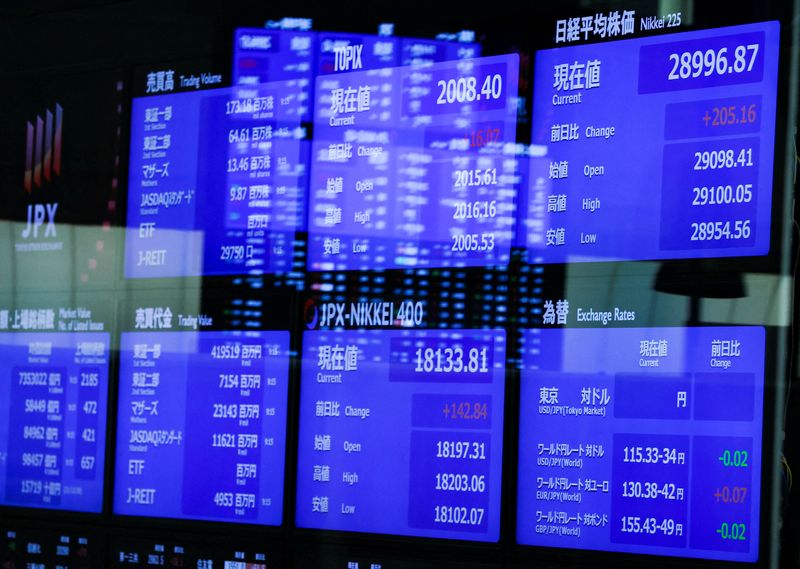By Jamie McGeever
(Reuters) - A look at the day ahead in Asian markets.
Australian inflation tops the Asian-Pacific economic calendar on Wednesday with the latest Chinese lending figures potentially due for release too, as investors also grapple with mixed news from the Asian tech sector.
Wall Street's lackluster performance on Tuesday is unlikely to provide much impetus - the Nasdaq closed flat while the Dow and S&P 500 slipped into the red - so perhaps the key regional indicators will give markets some early direction.
Australia's weighted annual consumer price inflation rate is expected to have fallen sharply in November to 4.4% from 4.9%. This would be the lowest in almost two years, and would follow an even steeper fall the month before to 4.9% from 5.6%.
Aussie swaps markets are indicating around 50 basis points of rate cuts from the central bank this year, with the first quarter-point cut coming by August. A weaker-than-expected CPI report could well increase these policy easing expectations.
New bank loans in China, meanwhile, likely rose in December, bringing 2023 lending to a new record high as the central bank keeps policy accommodative to support a shaky economic recovery.
Figures this week are expected to show that Chinese banks issued 1.40 trillion yuan in net new yuan loans last month, up from 1.09 trillion yuan in November. If these numbers are borne out, total new lending in 2023 would hit 22.98 trillion yuan, beating the previous record of 21.31 trillion yuan in 2022.
But China's economy and markets are still underperforming and struggling to convince foreign investors that 2024 will witness a meaningful recovery. Rising tensions with Taiwan, which goes to the polls on Saturday, won't help either.
Taiwan on Tuesday reported a stronger-than-expected rise in exports in December thanks to a near 50% surge in sales to the United States. But China remained a weak spot - Taiwan's exports to China fell 6.4%.
Later on Wednesday Taiwan's TSMC, the world's largest chipmaker, unveils its latest monthly sales figures.
Asian tech has got off to a particularly rocky start this year, with the MSCI Asia IT index down 4.5% since the turn of the year and the Asia ex-Japan equivalent down 5%. That compares to the Nasdaq's 1% year-to-date slip.
Sentiment will have been dented further by Samsung (KS:005930), which reported a likely 35% drop in fourth-quarter operating profit on Tuesday, much worse than analysts expected.
If there has been little New Year cheer across major U.S. and global stock markets, it has been in even shorter supply in Asia. The MSCI Asia & Pacific ex-Japan share is down 3.5% so far this year, compared with a decline of around 1% for the MSCI World index and S&P 500.
Here are key developments that could provide more direction to markets on Wednesday:
- South Korea unemployment (December)

- Australia CPI inflation (November)
- China lending (December)
(By Jamie McGeever)